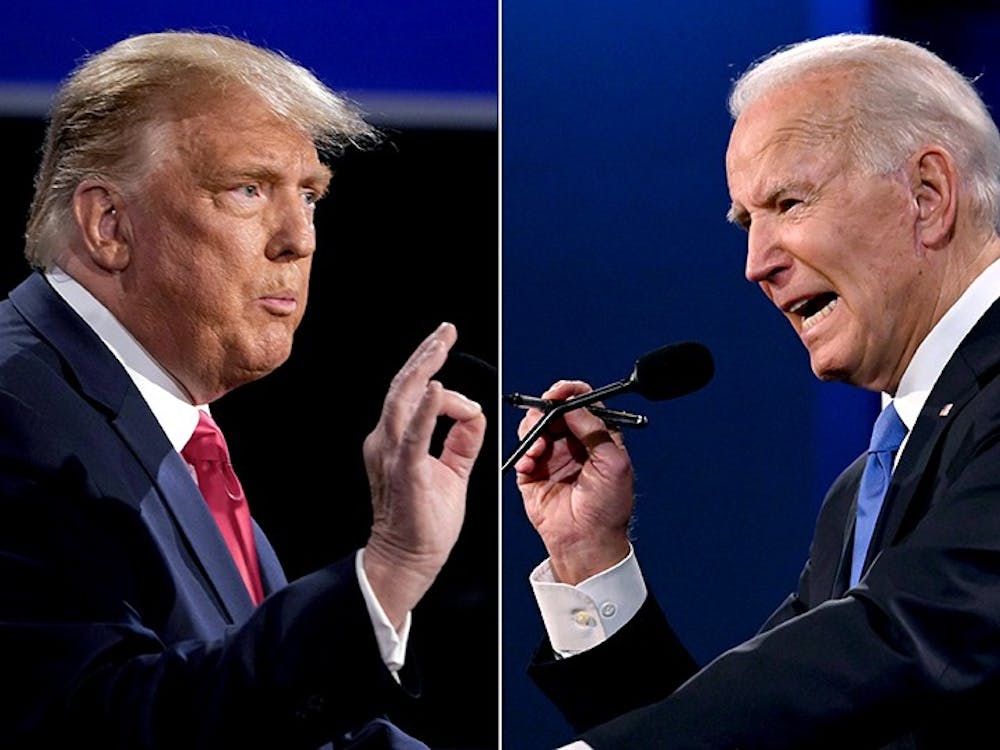After looking back on another election cycle's worth of debates, one thing is clear: We need a better way of comparing presidential candidates. One solution could be making moderators less important to the debate process.
If you chose to tune into the first Biden-Trump debate, then hopefully your mental recovery is going well. It would be hard to argue that it was a productive hour and a half or that it reflected well on American democracy. It was so bad it had CNN contributors cursing on live television.
Of course, this debate was definitely abnormal: Most presidential nominees do not give marching orders to white supremacist gangs or declare the upcoming election fraudulent. In fact, this year's final debate went much smoother, featuring some actual discussion. But does this mean our modern presidential debate structure is healthy?
Maybe not. Research suggests presidential debates might not be an effective way for voters to get a broad understanding of the candidates.
While it is challenging for political scientists to fully understand debates’ impacts, there is also some doubt that a candidate’s performance has a real impact on their electoral performance.
In his book "Presidential Debates: Risky Business on the Campaign Trail," Alan Schroeder cites studies that suggest debates play a bigger role in determining voters’ perceptions of the candidates than how they will actually cast their vote. For every example of an excellent debate performance propelling a candidate to the White House, there is a counterexample of a debate loser winning office anyway, such as Trump in 2016.
This research, alongside the disaster we saw onstage in September, means it’s necessary to rethink how we structure joint-candidate appearances in our elections.
The best place to start is the format. Modern presidential debates are very structured. There’s a moderator who asks questions and tries to keep control of the conversation.
However, this moderator often ends up taking up a lot of the viewers’ attention. Take these post-debate headlines from various 2020 debates, for example: “Moderators come under criticism online over contentious debate,” “CNN moderator criticized for question to Sanders,” and “Everyone Trashes Chris Wallace, the Debate Moderator Who Couldn’t.”
Not only is this negative attention distracting from the election itself, but the criticism might be true. A 2014 study shows debates led by the press are "unreflective of the public agenda."
So, perhaps one solution is to simply get rid of the moderators. While this idea might seem counterintuitive, it would not be unprecedented. The debates between Abraham Lincoln and Stephen Douglas in 1858 had no moderator at all, and they managed to stay relevant to this very day.
A moderator-free debate would force the candidates themselves to establish the debate topic, making it more likely the debate addresses the issues they care about and want to emphasize. This could give insight into how the candidate might govern — if an issue is important enough to focus a debate on, it stands to reason that it’s also important enough to try to legislate on. Giving candidates free reign over the debate could also give a better preview of how a potential president would use their position of power.
With that being said, many people, including campaigns and debate organizers, would likely feel that completely eliminating moderators is too extreme. With this in mind, simply establishing a debate format where moderators have significantly less impact could lead to a more productive debate.
One such possibility could be debates that are 100% in the town hall format, meaning all of the questions would be asked by audience members or random voters, without any coming from a moderator. A town hall format lets the voters set the agenda, and the 2014 study showed that "town hall debates are more reflective of public information needs.”
A similar debate format, which would be run by candidates instead of moderators, was actually the proposed format of the first American presidential debate, according to Schroeder in his book's conclusion. The Kennedy and Nixon campaigns rejected the idea, but the format is still often seen as the ideal debate set-up by pundits and scholars. In fact, a similar style is currently used in French presidential debates, leading to direct confrontation and a more personal relationship between the participants.
On the other hand, is it possible that a moderator-free debate would be chaotic and unproductive? Certainly — but if the worst-case scenario is no different from the debates we already have, why not give it a shot?

